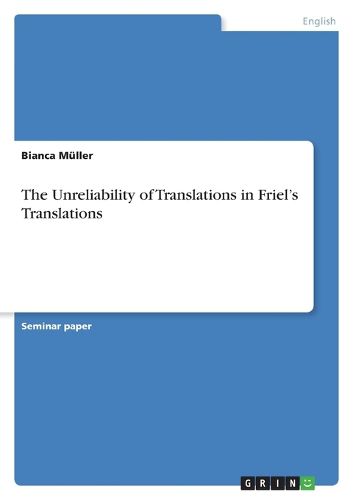Readings Newsletter
Become a Readings Member to make your shopping experience even easier.
Sign in or sign up for free!
You’re not far away from qualifying for FREE standard shipping within Australia
You’ve qualified for FREE standard shipping within Australia
The cart is loading…






Seminar paper from the year 2010 in the subject English Language and Literature Studies - Literature, grade: 2,3, University of Wuppertal, course: The Politics of Irish Drama, language: English, abstract: 1. Introduction The title of the play in question written by Brian Friel, namely Translations identifies one of the common concerns the leading Field Day dramatist shares with other postcolonial writers and which is subject of analysis in this essay. The playwright himself emerges as a translator of the Irish Gaelic past, illustrated by the fictional Gaelic-speaking community Baeile Beag in Donegal, into the political and economic realities of an Anglicized Ireland. The interpretation will be put forward that the central notion of the play is the unreliability of translation. Before one examines Friel’s utilisation of the concept ‘translation’ in the same-titled play, the technical term itself has to be clarified by drawing on some insights from translation theory. In addition to that, some brief comments will be made regarding the essay’s underlying ideas of language, culture and identity as these will be frequently points of reference during the course of this essay. In order to justify the interpretation introduced above, Friel’s theatrical device that is, to have the play enacted monolingual in the colonisers’ tongue has to be commented on. It will be illustrated that the shift from one language (Irish) to another (English) is presented in the play as a predictable consequence of at least three forces: Firstly, the establishment of the National School System; secondly, the utility to learn English; thirdly, the perhaps strongest force presented as a powerful metaphor, the ordnance survey. The subsequent interpretations are rather based on character readings. Sarah, the mute hedge school student is of special interest because she represents the close connection between name and identity. Owen, the hedge school teacher’s younger son has to be paid closer atten
$9.00 standard shipping within Australia
FREE standard shipping within Australia for orders over $100.00
Express & International shipping calculated at checkout
Seminar paper from the year 2010 in the subject English Language and Literature Studies - Literature, grade: 2,3, University of Wuppertal, course: The Politics of Irish Drama, language: English, abstract: 1. Introduction The title of the play in question written by Brian Friel, namely Translations identifies one of the common concerns the leading Field Day dramatist shares with other postcolonial writers and which is subject of analysis in this essay. The playwright himself emerges as a translator of the Irish Gaelic past, illustrated by the fictional Gaelic-speaking community Baeile Beag in Donegal, into the political and economic realities of an Anglicized Ireland. The interpretation will be put forward that the central notion of the play is the unreliability of translation. Before one examines Friel’s utilisation of the concept ‘translation’ in the same-titled play, the technical term itself has to be clarified by drawing on some insights from translation theory. In addition to that, some brief comments will be made regarding the essay’s underlying ideas of language, culture and identity as these will be frequently points of reference during the course of this essay. In order to justify the interpretation introduced above, Friel’s theatrical device that is, to have the play enacted monolingual in the colonisers’ tongue has to be commented on. It will be illustrated that the shift from one language (Irish) to another (English) is presented in the play as a predictable consequence of at least three forces: Firstly, the establishment of the National School System; secondly, the utility to learn English; thirdly, the perhaps strongest force presented as a powerful metaphor, the ordnance survey. The subsequent interpretations are rather based on character readings. Sarah, the mute hedge school student is of special interest because she represents the close connection between name and identity. Owen, the hedge school teacher’s younger son has to be paid closer atten